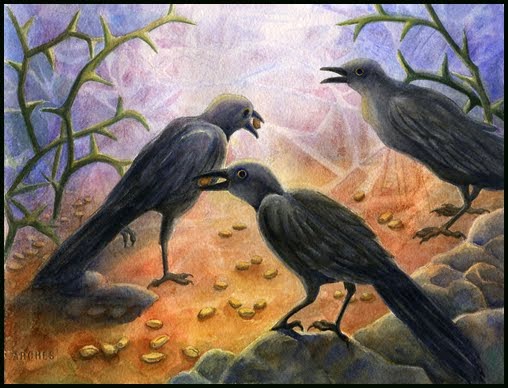And Jesus began to speak to them again: “I am the
light of the world; he who follows me will not walk in darkness, but have the
light in which there is life.”
Then the Pharisees said to him, “How can you be
your own witness? Your testimony is not valid.”
Jesus answered them, “Even if I do bear witness to
myself, my testimony is valid, for I know from where I come and where I am
going. You judge according to the physical aspect of Man, but I judge no one.
Yet even if I did judge, my judgment would be valid; for I am not alone, but HE
who sent me is with me. In your Law it says that the testimony of two persons
is valid. I bear witness to myself, and the Father who sent me also testifies
to me.”
Then they said, “Where is your Father?” And Jesus
answered, “You know neither me nor my Father. I you knew me, you would know my
Father also.” These words he said as he was teaching in the treasury of the
Temple. And no one seized him because his hour had not yet come.
3rd Passiontide
March 22, 2015
John 8: 12 – 20
The sun generates a
tremendous amount of energy, which it radiates forth into the universe. It
pours out the substance of its being as light and warmth. In the beginning it
called forth creation. The sun’s light and warmth continue to stimulate and
support life. Without the sun, we and the planet would soon die.
Christ calls himself the
light of the world. And this is no mere simile. For the being which once lived
within the sun, together with his Father generating and radiating its warmth
and light, that being came to live on earth in Christ Jesus. He is ever sacrificing
the substance of his own being to bring us life-giving forces. His life
stimulates our life; the life of our bodies, the life of our souls and spirits.
Our openness of soul and
spirit, heart and mind, are what allows him to shine his warmth and light into
us. He shines his invisible light on our path, illuminating the way. His
invisible light allows us to see truth amid the darkness of lies, illusions,
deceit. His warmth lets us experience his life-giving blessings. Had he not
come to earth, the planet would long since have died.
He came to make the earth
into a new radiant star, the star of love. He can only do so if we open
ourselves to his light, his warmth, his love. Then will he not only be with us;
he will be in us.
on
the skin of water reflected,
is
the spread of a sun,
and
the sun, like god, is a power
you
cannot see.
Only
what it lights on,
only
what it touches with warmth…[1]





_-_James_Tissot_-_overall.jpg)



.jpg)



.jpg)

